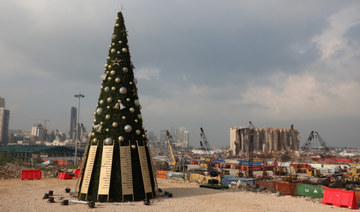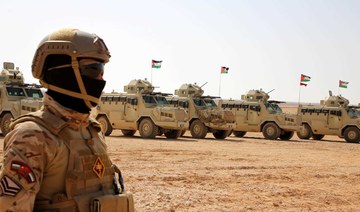DUBAI: If it weren’t for the obligatory mask wearing, endless flasks of sanitizer and social distancing rules — measures sure to remain in place as the COVID-19 pandemic continues — you would be forgiven for thinking that the UAE was having a “normal” year, perhaps even thriving. The Gulf nation, which has a history of surprising skeptics, seems to have found a balance between maintaining the necessary regulations to curb the virus and allowing residents and visitors to enjoy the country’s many attractions. Restaurants and hotels are packed and a range of festivities to celebrate the holiday season are taking place throughout the emirate—just like any other year.
The UAE may well be one of the only countries globally to experience some sense of normalcy now after one of the strangest years in living memory when lockdowns, cancellations, postponements, sickness, and socio-economic crises rocked the world.
Even so, many expats in the UAE are still unable to visit their families abroad (or vice-versa) due to recently renewed lockdowns and travel restrictions, and so are celebrating Christmas in Dubai differently this year.
“It is upsetting not to be with family on the holidays, especially with older relatives,” said Jennifer Adams, an American finance and business consultant who has lived in Dubai for 15 years. “We are very lucky to be in the UAE. The weather is beautiful, the situation is under control and there are many festive activities, especially for children.
“With the melting pot of nationalities here, I find it interesting to learn about other culture’s traditions,” she continued. “Friends who had to stay in Dubai are going out of their way to be festive and spend it with friends and extended families so that no one feels left out.”
The Tier 4 restrictions announced on Sunday Dec. 20 by UK Prime Minister Boris Johnson to contain a more infectious variant of COVID-19 that sent infection rates in the country soaring have made international travel challenging again. More than 40 countries in Europe, Asia, South America, the Caribbean and the Middle East have restricted travel to the UK. The UAE, which continues to share an air travel corridor with the UK, has not yet made any announcement regarding changes in passenger flights to or from the UK. UAE carriers Emirates and Etihad said they were operating per their schedule.
However, several UK residents in Dubai who were in the UK when Tier 4 was announced made swift arrangements to return to Dubai for Christmas.
“This will be our first Christmas away from the UK and our families,” said a Dubai resident from the UK who did not want to be identified. “We hadn’t planned to be here. We were supposed to be with my parents, who are now in Tier 4. It was a mixture of the Tier 4 announcement and so many borders closing that prompted our decision to jump on a plane back to Dubai.”
HIGHLIGHT
Expats make the most of Christmas in Dubai as renewed global coronavirus restrictions curtail travel plans.
She and her family plan to make the most of their first Christmas in Dubai, however. “We plan to go to church here as we do on Christmas Eve or Christmas Day in the UK,” she continued.
Darryl Albuquerque, an India citizen and US international tax specialist who lives with his family in Dubai, is celebrating his eleventh Christmas in the emirate.
“This year will be different from prior years due to the pandemic,” he told Arab News. “St Mary’s Church is awaiting permission for in-person services with reduced numbers, which means no opportunity to attend mass at the church. My wife, two daughters and my father- in-law will likely dress up in our Christmas best and sit in front of our TV at home for the live-streamed holy mass on YouTube on Christmas Eve. It will be unreal, as normally we go to St Mary’s for midnight mass and soak in the magical atmosphere. This year the magic will take place virtually.”
Albuquerque said that on Christmas Day they intend to be on video calls with extended family members in India.
“Thanks to the UAE Government allowing small but socially distanced gatherings, we may be bold enough to have a potluck lunch on the Christmas Day at a close friend’s place in walking distance from our home,” he continued. “The normal gala of Christmas celebrations being toned down also helps us realize what is truly important at Christmas: sharing, caring and simplicity. We believe that this too shall pass, and we look forward to next year.”
Teresa Geneloni, originally from Milan, Italy, has lived with her family in Dubai for eight years. She has decided not to return to Italy for Christmas this year due to the pandemic and the increasing restrictions in Italy, one of the worst-hit European nations, which last week surpassed one million infections.
The Genelonis usually spend Christmas at their home in Liguria, but said they are equally happy to celebrate it in Dubai.
“Everything we typically do in Italy we will do in Dubai this year,” Geneloni told Arab News. “It is also a special Christmas for us as it the last Christmas that we will be all together before our son goes to university next year. We will cook traditional Italian dishes, listen to Italian music from the Eighties and Nineties, and watch films, just as we do each year in Liguria.”
While the act of celebrating Christmas in Dubai is new for many expats, most say they are relieved to be in a place that feels safe. “There’s a positive energy in Dubai now, especially during Christmas,” Geneloni said. “We will bring Italy to Dubai this year.”



























